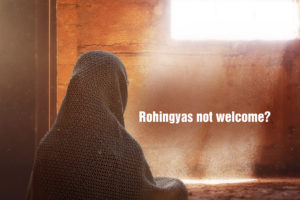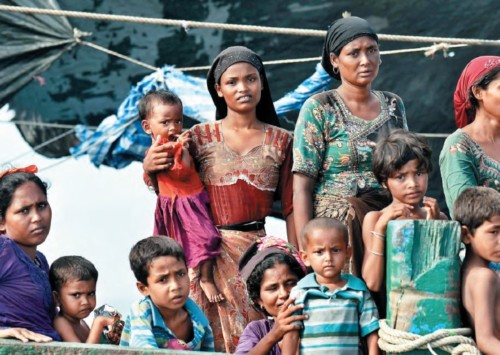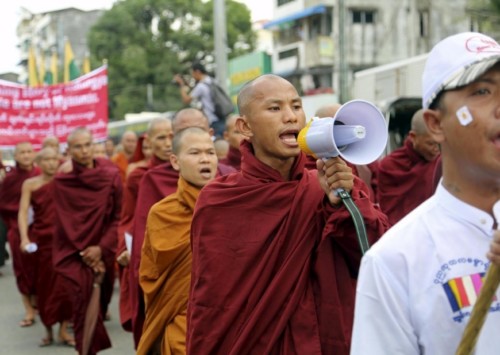Deportation threat looms on Rohingyas in India

Rohingyas in India now face the threat of deportation even as Myanmar refuses to recognise them as its citizens
Even as the Rohingyas remain among the most persecuted minorities in the world, India has shared its intent to identify and possibly deport immigrants, branding their presence as illegal.
Amounting to crimes against humanity, the actions of Myanmar’s government has not taken adequate steps in addressing the issue that has led to over 140,000 Rohingyas Muslims fleeing since 2012. As of today, Nobel laureate Aung San Suu Kyi has washed off state responsibility in the ‘ethnic cleansing’ which international bodies have identified and sought a probe into. India, a South Asian superpower, has had the opportunity to step up and provide refuge to this highly persecuted community. However, as recent reports of the government’s decision expressing Rohingyas as ‘illegal’ suggests, they don’t find a home in India either.
Rohingyas, traced back in lineage to Rakhine province of Myanmar, have fled the country in large numbers owing to reported persecution by the majority Buddhist community. Myanmar, which grants no official status to the community as citizens, has come under heavy criticism by the international community due to its glaring disregard to acknowledge or look into the large scale reports of state-sponsored violence on the Rohingyas. A UN body recognises around 14,000 Rohingyas refugees as registered in India with Refugee Status certificates to most and asylum seeker status to others. However, those who haven’t been documented or registered remain at much larger numbers.
With the country suddenly recognising the community not as refugees but as foreigners, who have entered the country ‘illegally’, they are likely to be looked at through the Indian Foreigners Act. This act provides for detection, arrest, prosecution and deportation of ‘illegal immigrants’. The Union Home Secretary, Rajiv Mehrishi chaired a meet earlier this week, to look into the Rohingya Muslims, who are living in India, where this strategy was discussed. Reports have pointed out that a Senior Home Ministry official outlined the ‘illegal’ route followed by Rohingyas to enter India, which is by sea, through Bangladesh border and through Chin area on Myanmar border.
#India knows the abuses #Rohingya have been facing in #Myanmar. Deporting them & abandoning them to their fates would be unconscionable https://t.co/EDZfbTH5aY
— Amnesty India (@AIIndia) April 6, 2017
India, which is not a signatory to the 1951 Refugee Convention or the following 1967 Protocol on the Status of Refugees, has showcased its lack of understanding in the issue of forced migration, which by definition involved dangerous and sub-legal channels of entry. As rules of asylum and admission in the capacity of a refugee status remains arbitrary and unclear, India’s proposed policies on Rohingyas do not come as much of a surprise. Incidentally, the country has been facing international flak for its treatment of international citizens living here ‘legally’. The humanitarian treatment one could expect from a country which prides itself for diversity and providing refuge to Afghani, Tibetan and other communities fleeing persecution and violence has not been met.
Amnesty International India shared, in a statement, “Forcing Rohingya asylum-seekers and refugees back to Myanmar would violate the international principle of non-refoulement – which is recognised in customary international law and is binding on India – that forbids states from forcibly returning people to a country where they would be at real risk of serious human rights violations.”
No country for Rohingyas
Mass exoduses of the community have taken place in the past decades with their largest displacement occurring in 2012 after villages were reportedly burnt down, with Human Rights Watch estimating numbers at 120,000. Even as ethnic cleansing is a term increasingly being used by activists and international organisations to capture the essence of the situation in Myanmar, the state remains in denial. “I think, ethnic cleansing is too strong an expression to use for what is happening,” stated Myanmar leader and Nobel Peace Prize winner, Aung San Suu Kyi, in a recent interview. She added, “It is Muslims killing Muslims as well.”
Reports by international bodies such as Amnesty International have established state-sponsored violence, which includes killing, rape and burning down of villages in a systematic and controlled manner, have outraged the international community, and led the UN to announce an official investigation into the matter two weeks ago. India, however, at this crucial point, has failed to show a humanitarian side.
@BBCBreaking 7 Nobel Peace Laureates, “What #Rohingya are facing is a textbook case of #genocide in which an entire community…systematically wiped out” pic.twitter.com/OKIW0PYIAu
— Haikal Mansor (@HaikalMansor) April 5, 2017











